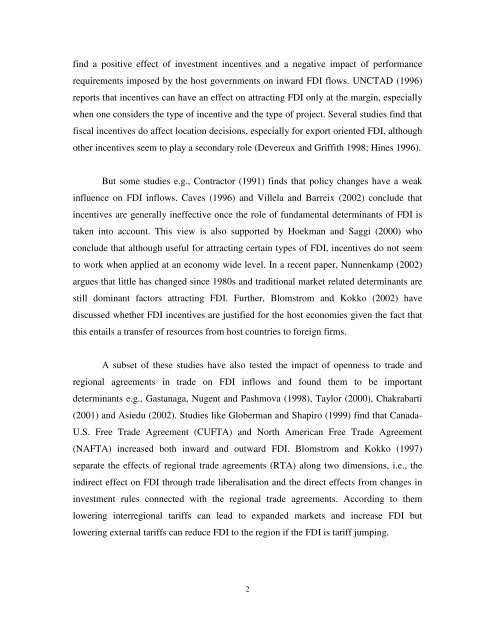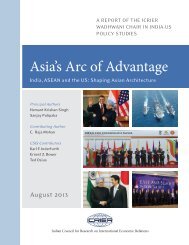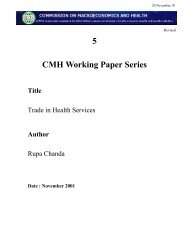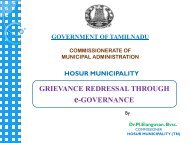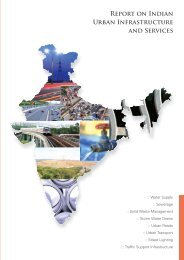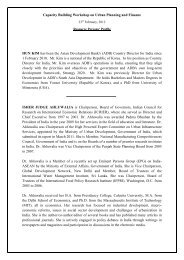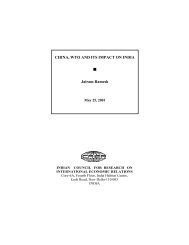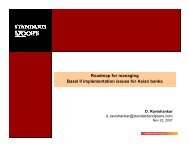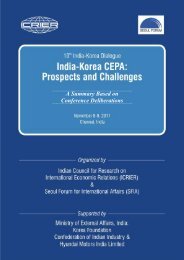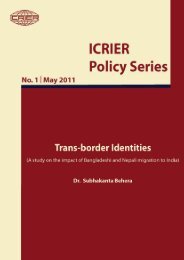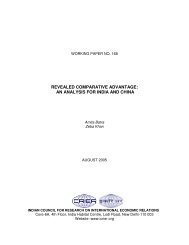impact of government policies and investment agreements on fdi ...
impact of government policies and investment agreements on fdi ...
impact of government policies and investment agreements on fdi ...
You also want an ePaper? Increase the reach of your titles
YUMPU automatically turns print PDFs into web optimized ePapers that Google loves.
find a positive effect <str<strong>on</strong>g>of</str<strong>on</strong>g> <str<strong>on</strong>g>investment</str<strong>on</strong>g> incentives <str<strong>on</strong>g>and</str<strong>on</strong>g> a negative <str<strong>on</strong>g>impact</str<strong>on</strong>g> <str<strong>on</strong>g>of</str<strong>on</strong>g> performance<br />
requirements imposed by the host <str<strong>on</strong>g>government</str<strong>on</strong>g>s <strong>on</strong> inward FDI flows. UNCTAD (1996)<br />
reports that incentives can have an effect <strong>on</strong> attracting FDI <strong>on</strong>ly at the margin, especially<br />
when <strong>on</strong>e c<strong>on</strong>siders the type <str<strong>on</strong>g>of</str<strong>on</strong>g> incentive <str<strong>on</strong>g>and</str<strong>on</strong>g> the type <str<strong>on</strong>g>of</str<strong>on</strong>g> project. Several studies find that<br />
fiscal incentives do affect locati<strong>on</strong> decisi<strong>on</strong>s, especially for export oriented FDI, although<br />
other incentives seem to play a sec<strong>on</strong>dary role (Devereux <str<strong>on</strong>g>and</str<strong>on</strong>g> Griffith 1998; Hines 1996).<br />
But some studies e.g., C<strong>on</strong>tractor (1991) finds that policy changes have a weak<br />
influence <strong>on</strong> FDI inflows. Caves (1996) <str<strong>on</strong>g>and</str<strong>on</strong>g> Villela <str<strong>on</strong>g>and</str<strong>on</strong>g> Barreix (2002) c<strong>on</strong>clude that<br />
incentives are generally ineffective <strong>on</strong>ce the role <str<strong>on</strong>g>of</str<strong>on</strong>g> fundamental determinants <str<strong>on</strong>g>of</str<strong>on</strong>g> FDI is<br />
taken into account. This view is also supported by Hoekman <str<strong>on</strong>g>and</str<strong>on</strong>g> Saggi (2000) who<br />
c<strong>on</strong>clude that although useful for attracting certain types <str<strong>on</strong>g>of</str<strong>on</strong>g> FDI, incentives do not seem<br />
to work when applied at an ec<strong>on</strong>omy wide level. In a recent paper, Nunnenkamp (2002)<br />
argues that little has changed since 1980s <str<strong>on</strong>g>and</str<strong>on</strong>g> traditi<strong>on</strong>al market related determinants are<br />
still dominant factors attracting FDI. Further, Blomstrom <str<strong>on</strong>g>and</str<strong>on</strong>g> Kokko (2002) have<br />
discussed whether FDI incentives are justified for the host ec<strong>on</strong>omies given the fact that<br />
this entails a transfer <str<strong>on</strong>g>of</str<strong>on</strong>g> resources from host countries to foreign firms.<br />
A subset <str<strong>on</strong>g>of</str<strong>on</strong>g> these studies have also tested the <str<strong>on</strong>g>impact</str<strong>on</strong>g> <str<strong>on</strong>g>of</str<strong>on</strong>g> openness to trade <str<strong>on</strong>g>and</str<strong>on</strong>g><br />
regi<strong>on</strong>al <str<strong>on</strong>g>agreements</str<strong>on</strong>g> in trade <strong>on</strong> FDI inflows <str<strong>on</strong>g>and</str<strong>on</strong>g> found them to be important<br />
determinants e.g., Gastanaga, Nugent <str<strong>on</strong>g>and</str<strong>on</strong>g> Pashmova (1998), Taylor (2000), Chakrabarti<br />
(2001) <str<strong>on</strong>g>and</str<strong>on</strong>g> Asiedu (2002). Studies like Globerman <str<strong>on</strong>g>and</str<strong>on</strong>g> Shapiro (1999) find that Canada-<br />
U.S. Free Trade Agreement (CUFTA) <str<strong>on</strong>g>and</str<strong>on</strong>g> North American Free Trade Agreement<br />
(NAFTA) increased both inward <str<strong>on</strong>g>and</str<strong>on</strong>g> outward FDI. Blomstrom <str<strong>on</strong>g>and</str<strong>on</strong>g> Kokko (1997)<br />
separate the effects <str<strong>on</strong>g>of</str<strong>on</strong>g> regi<strong>on</strong>al trade <str<strong>on</strong>g>agreements</str<strong>on</strong>g> (RTA) al<strong>on</strong>g two dimensi<strong>on</strong>s, i.e., the<br />
indirect effect <strong>on</strong> FDI through trade liberalisati<strong>on</strong> <str<strong>on</strong>g>and</str<strong>on</strong>g> the direct effects from changes in<br />
<str<strong>on</strong>g>investment</str<strong>on</strong>g> rules c<strong>on</strong>nected with the regi<strong>on</strong>al trade <str<strong>on</strong>g>agreements</str<strong>on</strong>g>. According to them<br />
lowering interregi<strong>on</strong>al tariffs can lead to exp<str<strong>on</strong>g>and</str<strong>on</strong>g>ed markets <str<strong>on</strong>g>and</str<strong>on</strong>g> increase FDI but<br />
lowering external tariffs can reduce FDI to the regi<strong>on</strong> if the FDI is tariff jumping.<br />
2


